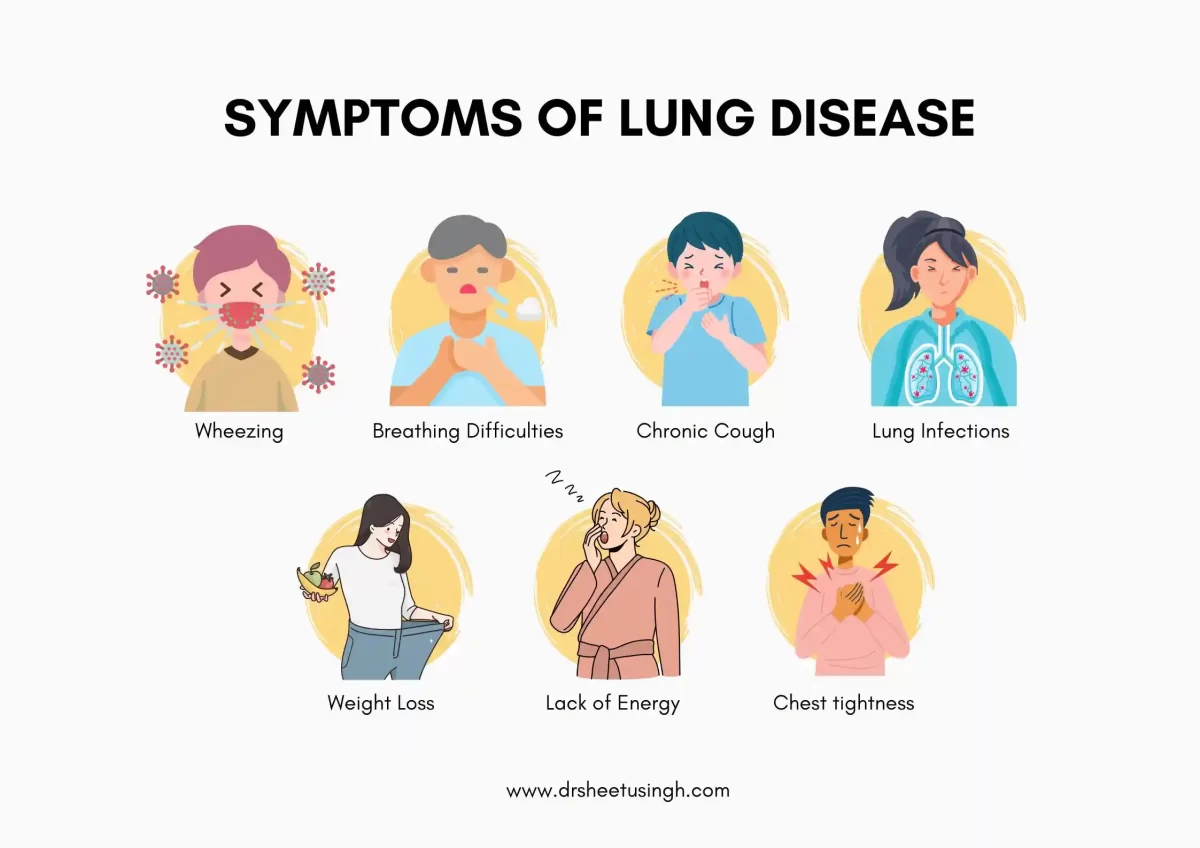
Warning Signs of Lung Disease: Our lungs work continuously, bringing oxygen to the body for energy and removing carbon dioxide waste through exhalations. However, when lung tissue becomes damaged, it starts early disease progression.
Recognizing initial subtle symptom manifestations proves paramount. Once advanced stages set in, one must seek timely interventions to prevent conditions from worsening. This guide covers distinguishing indications of emerging lung diseases needing medical attention.
Common Warning Signs
Lung diseases can be insidious, often presenting with initial signs that are either hard to notice or interpreted as ill health. A persistent cough, slight wheeze, or feeling of being short of breath could be either a terrible or inconsequential problem.
This is a potential manifestation of more profound lung disorders such as COPD, Asthma, or even lung cancer. Knowing the symptoms is the key to taking action before the disease fully develops and weakens life.
- Chronic Cough
When someone coughs and hacks constantly for over 2 months straight without stopping, it means hidden swelling or infection deep inside lung airways and tissue is bothering them. All that chronic coughing tries pushing up sticky “phlegm” mucus or germs out of smaller bronchial tube passages.
But if irritation and inflammation stay long-term, the cough signals serious problems needing medicines, making swollen air paths open wider again for freely breathing better.
- Shortness of Breath
Notice getting winded and gasping easily lately doing regular basic activities like shopping, laundry or even quick talking? That shows failing lung power, so see doctors before it gets secretly worse.
Even subtly avoiding little efforts tricks the mind about the lungs deteriorating slowly. But monthly robust respiratory resilience for bringing oxygen to move muscles drops bit by bit through gradual starvation. Catching causes quickly return lost ground using anti-inflammatory treatments, keeping precious airflow higher!
- Increased Sputum Production
Hacking up thick globs of white, yellow or green mucus phlegm and gook from the lungs despite constantly coughing to clear gunk points to hidden festering infection or swelling way down inside air tubes.
Too much spit signals lots of immune cell war against deeply buried germs taking over pathways. Checking tiny samples under microscopes identifies which bacteria or viruses brewing to guide special antibiotic medicines, kicking out those lung invaders to free clogged passages again!
- Unexplained Weight Loss
Skinnier scales with eating the same signals certain lung diseases plus related illnesses are secretly accelerating metabolisms way too high and dangerously burning calories faster from fighting hidden chemicals.
The worsening energy deficit then weakens resilience against coming breathing crises. Doctors stop rapid nutrition from disappearing, investigating why bodies require more fuel, checking absorption, levels, and intensities before severe shortages complicate recoveries ahead.
- Coughing Blood
When bloody red dots or streaks cough up into phlegm, it outrages lung specialists because visible blood internally means injured vessel leaks, likely ignoring bigger problems brewing like infections taking root later in weak spots unseen. Unless the nose is dripping tinges and throat mucus is pinkish initially, send out bloody phlegm samples immediately to start urgently securing prognosis testing and imaging checks investigating causes, preventing further spread of crises ahead!
Preparing for Your Doctor’s Visit
Being well-prepared to make the most of your hospital visit is worthwhile. Here are some tips:
- Bring your medical records or a summary of your health history
- Create a list of all your medicines, vitamins, and therapies.
- Write down the symptoms, when they began to show, and any factors that make them better or worse.
- Note other healthcare providers you are seeing and their reasons for these visits.
Diagnostic Tests
Depending on your symptoms and the medical history you offer, your doctor may demand different diagnostic tests to determine the cause of your lung problems. Some common tests include:
- Lung Function Tests (Spirometry). It determines the amount of air one can take in and expel at a time and the speed at which one can release carbon dioxide.
- Chest X-Ray or CT Scan. Imaging tests are used to see your lungs and verify no strange spots or blockages.
- Blood Tests. Providers can omit or affirm the particular lung disorders with certain blood tests.
Seeking Treatment
If you have a lung disease, your healthcare professional will be your companion in creating your unique therapy plan. Treatment options vary depending on the specific condition but may include:
- Medication. Drugs can be ingested using nebulizers, inhalers, or oral medications to treat symptoms and improve lung function.
- Oxygen Therapy. For advanced lung diseases, supplemental oxygen may be prescribed to relieve discomfort when breathing.
- Pulmonary Rehabilitation. Such a program integrates exercise, education, and nutritional information into a single strategy to enhance the condition of the lungs.
- Surgery. Some of the possible procedures that may be used include the removal of the diseased lung tissue by surgery or the operation of lung cancer treatment.
Conclusion
Catching early subtle signs of lung dysfunction enables halting disease advancement. So don’t overlook seemingly manageable symptoms until crises strike. Connect today with top pulmonologist Dr. Sheetu Singh! She accurately diagnoses the lung conditions bothering you before permanent capacity losses occur. Breathe freely through the healthy lungs life offers.
